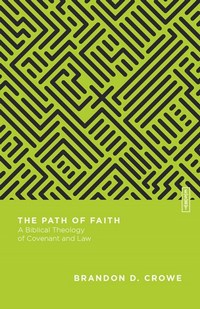 |
The Path of Faith:
|

What’s The Path of Faith About?
In his Introduction Crowe previews the book as a whole:
The topics of covenant and law are complex and have often been debated, but I’m not interested in getting bogged down in technical debates. Instead, in this book I make four key points.
- All people are obligated to obey their Creator.
- Though he did not have to, from the beginning God freely entered into a covenant with humanity to offer a reward upon the condition of perfect obedience.
- Only Jesus perfectly obeys God’s law, which is necessary for eternal life. Eternal life is granted by grace through faith on the basis of Christ’s work.
- Even though we can’t perfectly obey God’s law, the law continues to guide us in how we should live. Obedience to God’s law is still required. And yet obedience is not a burden but the path of blessing.
These are four landmarks to maintain your bearings in the discussion that follows, and they also serve as a handy summary of the book.
From there, the book traces the development of those concepts from Genesis to Revelation and at all points in between—as every book in this series has done/likely will do.
Relation between Old and New Covenant
Obviously, as he’s working through Redemptive History as it progresses, he begins with the Old Covenant—but always keeps the New Covenant in view, as the goal of the Old. I was particularly struck by the way he did this in Chapter 5, “The Prophets: Remind, Reprove, Renew.” I noted a few times how helpful the discussion there was at pointing at the differences between the two covenants, while stressing the continuity of the two.
I didn’t realize (but admittedly should have assumed) that that chapter was merely the foundation for a lot of the chapters to follow—particularly in Chapter 9, “The New Covenant in Practice: Hebrews Through Jude.” Which was just dynamite, and was probably my favorite chapter in the book. It wasn’t necessarily “more practical” than the rest of the book—but its focus on what what The Path of Faith looks like for believers in a post-apostolic age makes it more obviously applicable to contemporary believers.
I should add that a lot of the material in that chapter came from/was similar to Crowe’s The Message of the General Epistles in the History of Redemption: Wisdom from James, Peter, John, and Jude—and I feel compelled to recommend that book at this time (I didn’t do a post on it when I read it back in 2015, or I’d point you to that).
Revelation
Revelation fittingly concludes the biblical canon by echoing earlier Scripture, highlighting the completed work of Christ and sketching a vision for the future. Revelation wrestles with the ambiguities and difficulties of this age but doesn’t leave the plot dangling. Revelation proclaims that Christ rules, and his people will be vindicated. Revelation is an immensely practical book that provides guidance for living today.
That last sentence is going to strike more than a few readers as odd—but it shouldn’t. While the previous chapter was my favorite, this one took a lot more thought and reflection—and was more striking for me. Believers in the twentieth and twenty-first centuries are not used to reading Revelation for reasons other than “cracking the code” and figuring out the eschatological message of the book. Which isn’t to say that’s not important—but as Crowe argues, the book is more practical than that.
It’s crucial that we recognize and heed Revelation’s calls to faithfulness in life. We go astray if we think of Revelation as a fatalistic book of predictions. Revelation does not teach us to shut our eyes and sing, Que Será, Será (“whatever will be, will be”). Instead, Revelation provides motivation for faithful covenant living in the present, in light of God’s promises about the future.
This means Revelation is not only about the future; it’s about the entire age of the church, from the first coming of Christ to his second coming. It doesn’t focus only on the last few years of world history; it’s about every era of the church’s history. It’s about things that are persistently true. As one helpful book on Revelation puts the matter, “[Revelation] is a book for every age. It is always up to date.”
Given that reminder about the purpose of Revelation, Crowe’s able to point to the call for faithfulness, the motivations to perverse and the promise of the consummation of the covenants at the end.
So, what did I think about The Path of Faith?
It has been a while since I’ve read a book in this series—primarily because the outline was getting a bit repetitive, and it was causing me to glaze over a bit. It’s been long enough and (based solely on recollection without looking at a prior volume to compare) I think Crowe approaches it with a just-noticeable tweak to the standard outline that I was able to appreciate what he was saying without struggling to differentiate this work from the others.
Even without that gap for myself, I found this to be one of the (if not the) strongest volumes in the series—Crowe is able to deliver on explaining his summary from the introduction, explaining and expanding on them in each era of Redemptive History so that those of us living in the New Covenant age can profit from what was written for our benefit in the Old and seeing what our Covenant Head accomplished for us and for our salvation.
This is a great work on the ideas of Covenant and Law and I strongly encourage you to give it a read.

This post contains an affiliate link. If you purchase from it, I will get a small commission at no additional cost to you. As always, opinions are my own.
![]()



Read Irresponsibly, but please Comment Responsibly